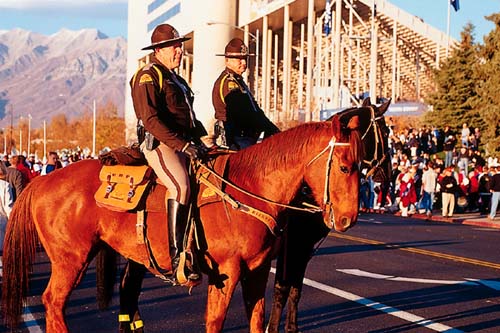The Age of the Earth
I am somewhat at a loss as to how to respond to Randall D. Shortridge’s comments on the age of the earth (“Letters,” May 1995). First, it should be noted that there are many different methods for dating ancient specimens. Some are in their developmental stages, but there are a number of tried and true methods which yield results that, when properly applied, are not at all “hotly disputed.” I should know, I am a geochronologist.
Second, Shortridge provides us with hearsay evidence that “many” scientists, within and without the LDS Church, doubt the antiquity of the earth and, therefore, evolution. I can only respond with my own hearsay evidence. I do not know of a single academic scientist (LDS or otherwise) in the fields of anthropology, geology, biology, chemistry, or physics, that has expressed doubt to me regarding the antiquity of the earth. They may be out there, but I have not met them.
—Stephen Nelson, PhD
Las Vegas, Nev.
Folklore and Faith
I was appalled to read in William A. Wilson’s article (May 1995) about the missionary who accidentally killed an investigator’s pet cat and then cleverly concealed his act from the investigator during the balance of the discussion by stroking the cat and pretending it was still alive. It is difficult to believe that any Latter-day Saint would consider such “folklore” amusing or faith promoting, or that such a story would be passed amongst our church with an implied approval of the act.
Why wouldn’t the missionary tell the truth? Why the deceit? Why no expression of remorse? If this is an example of “Mormon folklore,” one can only wonder what kind of spirit animates that portion of our membership which would react with anything less than total disapproval of such an act of deceit by a missionary who supposedly represents the true and living God.
—Donald N. Perkins
Mount Clemens, Mich.
In reference to William A. Wilson’s article on folklore, it seems that the author is getting the same glee as an eight year old telling his younger brother, “See, I told you there is no Santa Claus.”
Heavenly days! What next shall we hear debunked? That David did not slay Goliath? That Jonah wasn’t swallowed by a whale? What about the golden plates and angels? Are these stories just part of the “folklore” that we simple-minded people build our lives believing? I think not.
—Alton F. Ogborn
Salinas, Calif.
I appreciated very much reading William A. Wilson’s article on folklore. This topic has interested me over many years, and I am sometimes fascinated at the interpretation often given by seemingly intelligent people. I have one such story I would like to relate.
When the late Harold Clark was called to be the first president of the Provo Temple, his home rested upon the mountainside above and to the east of the Provo Temple. When I was called to succeed him, he related a number of his personal experiences. He told me that he often had members of the Church approach him by stating that they had heard that President Clark had publicly stated that on a given night, he had looked outward toward the temple and saw the interior lights burning. A moment later the telephone rang with President Harold B. Lee on the line. President Lee is supposed to have said, “President Clark, don’t be concerned about the lights in the temple; we are here meeting with the Savior.”
Within a week or two of my setting apart, I began receiving the same questions, except that it was President Kimball calling me at my American Fork home informing me that he and his counselors were in the temple meeting with the Savior. On one occasion, after speaking at a fireside in Murray, the bishop of the ward took me aside with the following question, “President Gunther, I just want to confirm something. My brother told me that he personally heard you say in the Provo Temple that President Kimball called you at your home one night and told you that he and his counselors were meeting with the Savior in the Provo Temple.” This question was asked of me again and again during the four years of my administration, and I am certain I disappointed many people when I told them the incidents never occurred.
I liked Professor Wilson’s conclusion suggesting that we are too self-serving, desiring miraculous confirmation of our inner desires and that we are too delinquent in creating a flow outward to others.
—Orville C. Gunther
American Fork, Utah
William A. Wilson’s article was well written and had a very valid message. However, I was offended that the sacred experience of my great-grand-father, Joseph Edward Gubler, was held up for ridicule. He did miraculously receive a loaf of freshly baked bread wrapped in the dish towel of his wife, Mary Amelia Hunt Gubler, while serving in the Southern States Mission just after the turn of the century.
Not only did Joseph Edward and Mary Amelia verify the experience, but their older children well remember being interrogated about the missing loaf of bread that had been set out to cool.
Just because hundreds of versions of his story have evolved in the well over half a century since his experience was first published in the Church News, it does not change the truth of his original experience.
—Laurie J. Bradley
Henderson, Nev.
Congratulations to William A. Wilson for his article on Mormon folklore and thanks to Brigham Young Magazine for running it.
In the same vein, I offer the following two quotations:
“It is better not to have so much faith, than to have so much as to believe all the lies.”
—Hyrum Smith, HC, 6:301.
“As the painting grew in popularity, so did the stories concerning its authenticity in depicting the Savior. The most popular one, Parson says, deals with a young girl pointing at the painting and proclaiming at a fireside program being given by the artist, ‘That’s him! That’s the man that comforted me when my parents were killed in a car accident.’ The story is not true.”—Ricks College, Summit, Spring 1993.
—Steve Warren
West Valley City, Utah
I just finished reading William A. Wilson’s excellent article on Mormon folklore and appreciated his insights into what the stories we tell can teach us about ourselves. I would like to add my personal perspective on the danger of stories, such as the child being saved from drowning, which may lead us to believe that if we are righteous, we will be protected from tragedies. Of course, that isn’t true.
Our 18-month-old son fell into a large plastic tub that had collected rainwater in our backyard and, as a result, sustained severe brain damage. And while I think it was miraculous that he survived after being in full arrest for over 40 minutes, I know for myself that the Lord doesn’t always protect us from tragedy and heartache. My son continues to make gradual progress and I do feel the Lord is blessing him, but I find it interesting the stories people tell me as they try to provide some comfort for themselves and us.
The most prevalent story concerns a boy who is born with severe mental and physical handicaps. When he is a teenager, his mother feels prompted to have him receive his patriarchal blessing, which tells him that he was one of the great spirits who escorted Lucifer from Heavenly Father’s presence, at which time Satan swore in his wrath that he would use all of his evil power to overcome this great spirit when he entered mortality. However, Heavenly Father foiled Satan’s plan by sending the boy to earth severely handicapped.
I know these well-meaning people are trying to tell me our child has worth, but this story is telling because the reason the boy has worth is because he had an important position in the pre-existence, not simply because he is a child of God like everybody else. In essence, they are saying, “Although your son will never amount to much in this life, isn’t it nice to think about how great he probably was before he came to earth?”
I hope that doesn’t sound too cynical. I do not fault the people who tell me this story. They are no doubt good people, but sometimes they don’t stop to consider the ramifications of what they are saying.
So like Professor Wilson, I, too, am hoping to hear stories that reflect a more charitable people (and in my experience, the people who came to help us weren’t Three Nephites), rather than tales that attempt to provide easy, pat answers to the very complex challenges of mortality.
—Kristen Haines Jenson
Vallejo, Calif.
Preserving the Constitution
I was absolutely amazed that someone with an LDS perspective of the U.S. Constitution and especially a professor at BYU could have such a strange interpretation of our Constitution, as the article by Richard Davis reflects in your May 1995 issue.
How did he miss what the majority of Americans indicated in the last election? The federal usurpation of state’s rights as listed in the Tenth Amendment, if allowed to continue under Davis’s progressive expressions, will eventually eliminate the rest of the Bill of Rights along with the Constitution. Such a loose social rationale as he suggests has already eroded many of our freedoms with uncontrollable federal expansion.
—Jared F. Brown
Ogden, Utah
Thanks to Richard Davis for his perspective of Constitutional principles. However, I must say “no thanks” to his attempt to speak for my racial group.
As an Italian-American, I do not feel I’ve been historically “underrepresented in the U.S. Senate.” I currently have two senators (Hatch and Bennett of Utah) who are do-ing a good job representing me. Although neither is Italian-American, they are promoting my political philosophy in Washington.
I’m LDS but don’t limit my political alliances to those of my faith. I’m a vegetarian but don’t require that diet of my elected officials. I am, however, a political conservative and that’s what is important in the polling booth. It doesn’t matter if a candidate is black, Buddhist, or carnivorous if he or she can do the best job enacting laws based on the principles I feel are most beneficial to all.
—Jim Catano
Provo, Utah
When I read the article by Richard Davis, wherein he said, “ ‘Pickling’ the Constitution requires Americans to revert to a ‘horse-and-buggy’ age the framers knew but that we have long since abandoned,” I was reminded of something said by President J. Reuben Clark (not exactly a Constitutional slouch): “These were the horse-and-buggy days as they have been called in derision . . . but these were the men who carried under their hats, as they rode in the buggies and on their horses, a political wisdom garnered from the ages. As giants to pygmies are they when placed alongside our political emigres of today” (Church News, Nov. 29, 1952).
—John R. Cox
Twin Falls, Idaho
Although I do not agree with all that Richard Davis wrote on the Constitution, his essay is a timely and refreshing corrective to the uncritical tendency of many Latter-day Saints to deify the framers of the Constitution.
Scripture teaches us that the framers were inspired, and we know from their writings that they were among the best and brightest men of the 18th century. Nevertheless, inspiration and wisdom do not guarantee that one can foretell the future, and the framers did not anticipate many of the constitutional controversies that currently bedevil the United States. As Dr. Davis points out, it is simply impossible to know what the framers would have thought about current conflicts over religious teaching and worship in public schools, because government-funded elementary and secondary education was virtually unknown at the time the Constitution was ratified.
Moreover, many of the controversies that the framers did anticipate were resolved incorrectly. For example, many of the framers were slaveholders, and all of them thought women to be incapable of participating in government (even as mere voters) and of thinking clearly about intellectual and political matters. The views of such men are not very helpful to a nation struggling to define whether and how the Constitution now prohibits racial and gender discrimination by government.
Even when the views of the framers are known and relevant to a particular constitutional question (which they often will not be), Latter-day Saints are not bound by these views, and we may even profit by ignoring them. The Supreme Court’s recent interpretations of the free exercise clause are precisely congruent with what we know about the framers’ views on the free exercise of religion, yet they constitute a serious threat to religious freedom. Those who value religious liberty hope that we may yet leave the framers behind on this issue.
–Prof. Frederick Mark Gedicks
J. Reuben Clark Law School
I was delighted to see Richard Davis point out that the Constitution is “not a perfect document.” However, although Mr. Davis did state that “adaptation [is] a cardinal constitutional principle,” I was disappointed that this subject was treated superficially. The article sets up the classic rivalry between those who cherish it as a static document, thus “pickling” it, and those who cherish it for what it can become, thus “preserving” a “more perfect Constitution.” But this set up almost entirely misses the debate on the adaptability of the Constitution. Everybody (almost) understands the need for a “living” Constitution, and most profess an appreciation of the founders’ wisdom in providing a way to amend the Constitution. The debate is not if but how the principles of the Constitution should be adapted or amended. One side had successfully (if one defines success numerically) revised constitutional principles through the courts. The rival side of the debate does not want to “pickle” the Constitution, but does believe that revising constitutional principles through the courts has put us in a “pickle.”
—Conrad H. Knudson
Charlottesville, Va.
While I agree with Richard Davis that, “the genius of the Constitution [lies] in its adaptability . . . to cope with current problems and current needs,” I am deeply concerned by his statement that our government should “adjust the [Constitution] to its own needs.” Additionally, I am dismayed by his suggestion that if we fail to do so, we are “attempting to retrogress to a bygone era.”
It is a great mistake to believe that the alternative to an intrusive government is one which hides its head in the sand. While the “innovativeness and pragmatism” of the founding fathers should be applied in addressing the problems of our day, it is a serious error to assert that rejecting the sweeping reforms proposed today somehow “pickles” the Constitution. We must not be blind to the dangers of a government which has already widely overstepped its bound and is now interfering with many aspects of our daily lives in which it does not belong. The role of government is not to give its citizens everything they need, but to give its citizens the opportunity to provide for themselves what they need. It is not the function of government to develop its own programs to meet all the needs of society nor to convolute the words of the Constitution to find the authority to do so.
While adaptability is the genius of the Constitution, interpretation of our rights in a changing world must be done carefully and wisely.
—Nancy D. Reber
Bakersfield, Calif.
Richard Davis says the Supreme Court must reinterpret (change) the Constitution to adapt it to current thinking because it was written by men with an 18th century “horse-and-buggy” world view.
But the Lord said, “I established the Constitution of this land, by the hands of wise men whom I raised up” (D&C 101:80), and Joseph Smith prayed under inspiration that its principles be established forever (D&C 109:54).
Arguing that the Constitution must be changed to fit modern times is like saying the Ten Commandments, written in a pastoral age, must be revised to conform to modern thinking.
—Jerome and Edith Horowitz
Ogden, Utah
—Jerome S. and Wendy Horowitz
Bountiful, Utah
Brigham Young Magazine welcomes letters to the editor up to 200 words in length. Letters should be typed, if possible, and may be edited for space and clarity.









